Organisational Behaviour in Hospitality: Analysis and Application
VerifiedAdded on 2023/01/17
|9
|2908
|88
Report
AI Summary
This report delves into the realm of organisational behaviour (OB) within the hospitality sector, specifically using the Rosewood hotel as a case study. The report begins with an introduction to OB and its significance in the workplace, discussing how organisational culture, power dynamics, and political influences shape individual and team behaviour and performance. It then explores content and process theories of motivation, such as Herzberg's two-factor theory, and applies motivational techniques to enhance goal achievement. Furthermore, the report examines the characteristics of effective and ineffective teams, referencing Tuckman's stages of team building. Finally, it applies concepts and philosophies of organisational behaviour, including the Path-Goal theory and situational leadership, to a given business scenario, such as employee strikes, offering insights into leadership styles and their impact on workplace dynamics. The report concludes by summarizing the key findings and emphasizing the importance of OB principles in the hospitality industry.
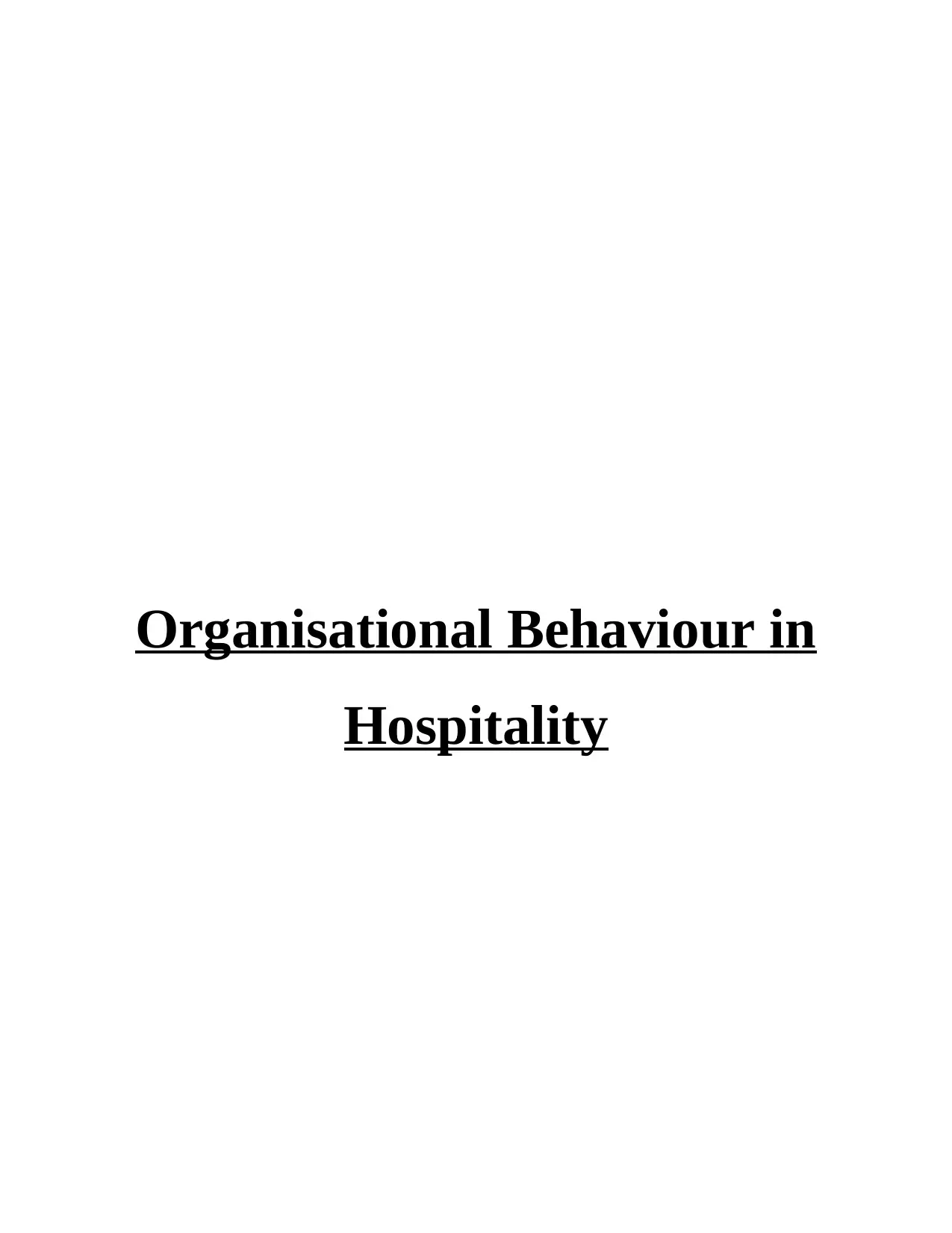
Organisational Behaviour in
Hospitality
Hospitality
Paraphrase This Document
Need a fresh take? Get an instant paraphrase of this document with our AI Paraphraser
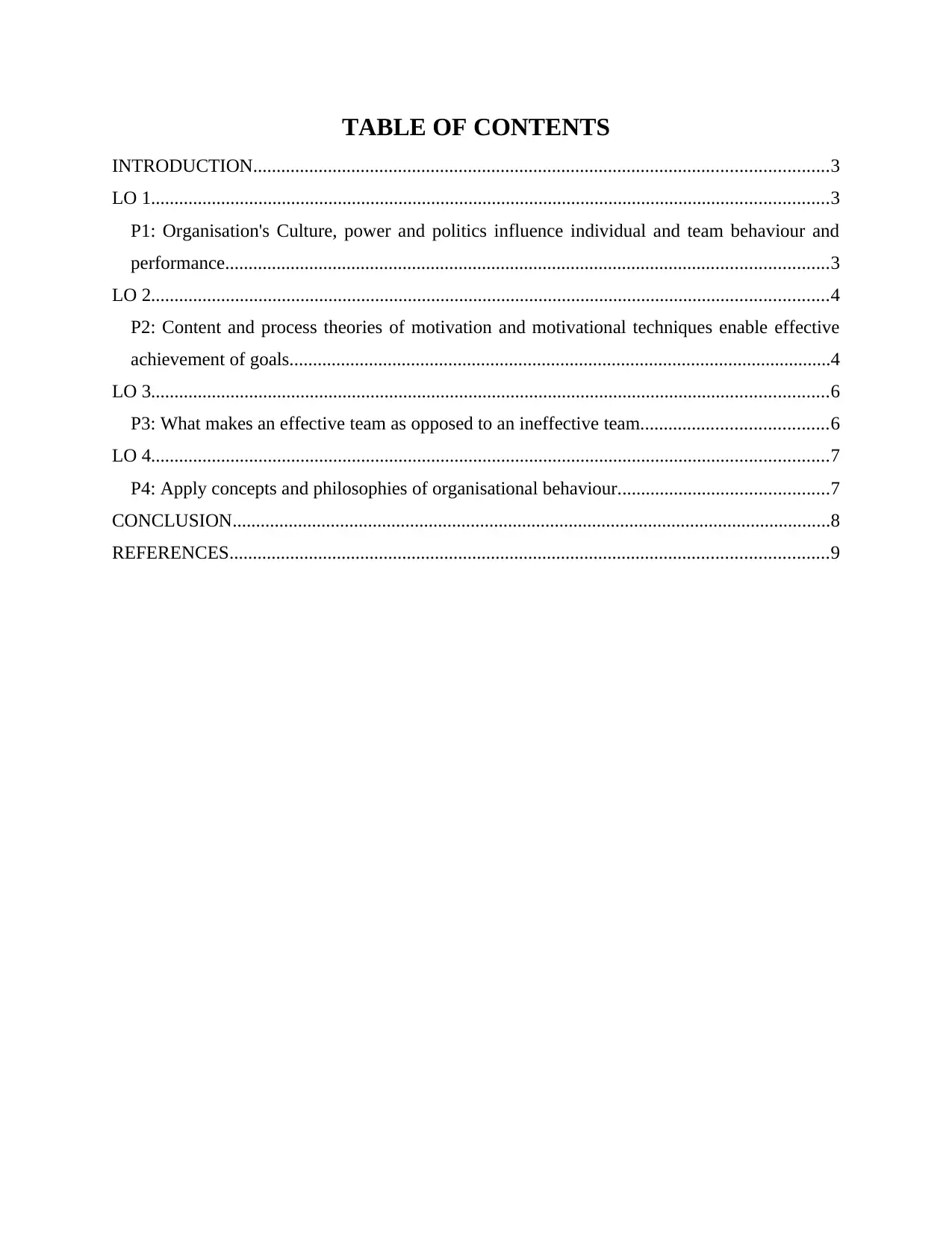
TABLE OF CONTENTS
INTRODUCTION...........................................................................................................................3
LO 1.................................................................................................................................................3
P1: Organisation's Culture, power and politics influence individual and team behaviour and
performance.................................................................................................................................3
LO 2.................................................................................................................................................4
P2: Content and process theories of motivation and motivational techniques enable effective
achievement of goals....................................................................................................................4
LO 3.................................................................................................................................................6
P3: What makes an effective team as opposed to an ineffective team........................................6
LO 4.................................................................................................................................................7
P4: Apply concepts and philosophies of organisational behaviour.............................................7
CONCLUSION................................................................................................................................8
REFERENCES................................................................................................................................9
INTRODUCTION...........................................................................................................................3
LO 1.................................................................................................................................................3
P1: Organisation's Culture, power and politics influence individual and team behaviour and
performance.................................................................................................................................3
LO 2.................................................................................................................................................4
P2: Content and process theories of motivation and motivational techniques enable effective
achievement of goals....................................................................................................................4
LO 3.................................................................................................................................................6
P3: What makes an effective team as opposed to an ineffective team........................................6
LO 4.................................................................................................................................................7
P4: Apply concepts and philosophies of organisational behaviour.............................................7
CONCLUSION................................................................................................................................8
REFERENCES................................................................................................................................9
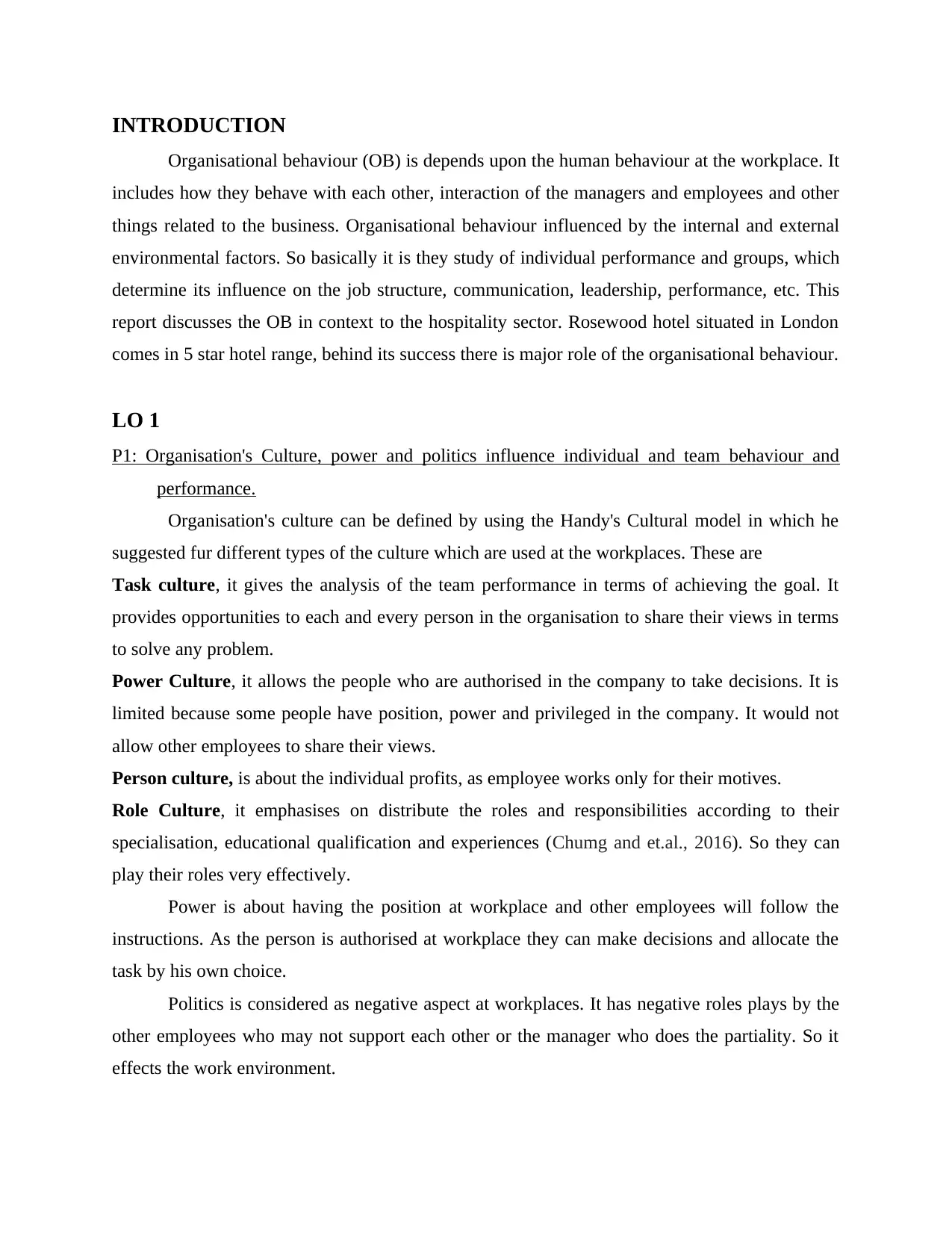
INTRODUCTION
Organisational behaviour (OB) is depends upon the human behaviour at the workplace. It
includes how they behave with each other, interaction of the managers and employees and other
things related to the business. Organisational behaviour influenced by the internal and external
environmental factors. So basically it is they study of individual performance and groups, which
determine its influence on the job structure, communication, leadership, performance, etc. This
report discusses the OB in context to the hospitality sector. Rosewood hotel situated in London
comes in 5 star hotel range, behind its success there is major role of the organisational behaviour.
LO 1
P1: Organisation's Culture, power and politics influence individual and team behaviour and
performance.
Organisation's culture can be defined by using the Handy's Cultural model in which he
suggested fur different types of the culture which are used at the workplaces. These are
Task culture, it gives the analysis of the team performance in terms of achieving the goal. It
provides opportunities to each and every person in the organisation to share their views in terms
to solve any problem.
Power Culture, it allows the people who are authorised in the company to take decisions. It is
limited because some people have position, power and privileged in the company. It would not
allow other employees to share their views.
Person culture, is about the individual profits, as employee works only for their motives.
Role Culture, it emphasises on distribute the roles and responsibilities according to their
specialisation, educational qualification and experiences (Chumg and et.al., 2016). So they can
play their roles very effectively.
Power is about having the position at workplace and other employees will follow the
instructions. As the person is authorised at workplace they can make decisions and allocate the
task by his own choice.
Politics is considered as negative aspect at workplaces. It has negative roles plays by the
other employees who may not support each other or the manager who does the partiality. So it
effects the work environment.
Organisational behaviour (OB) is depends upon the human behaviour at the workplace. It
includes how they behave with each other, interaction of the managers and employees and other
things related to the business. Organisational behaviour influenced by the internal and external
environmental factors. So basically it is they study of individual performance and groups, which
determine its influence on the job structure, communication, leadership, performance, etc. This
report discusses the OB in context to the hospitality sector. Rosewood hotel situated in London
comes in 5 star hotel range, behind its success there is major role of the organisational behaviour.
LO 1
P1: Organisation's Culture, power and politics influence individual and team behaviour and
performance.
Organisation's culture can be defined by using the Handy's Cultural model in which he
suggested fur different types of the culture which are used at the workplaces. These are
Task culture, it gives the analysis of the team performance in terms of achieving the goal. It
provides opportunities to each and every person in the organisation to share their views in terms
to solve any problem.
Power Culture, it allows the people who are authorised in the company to take decisions. It is
limited because some people have position, power and privileged in the company. It would not
allow other employees to share their views.
Person culture, is about the individual profits, as employee works only for their motives.
Role Culture, it emphasises on distribute the roles and responsibilities according to their
specialisation, educational qualification and experiences (Chumg and et.al., 2016). So they can
play their roles very effectively.
Power is about having the position at workplace and other employees will follow the
instructions. As the person is authorised at workplace they can make decisions and allocate the
task by his own choice.
Politics is considered as negative aspect at workplaces. It has negative roles plays by the
other employees who may not support each other or the manager who does the partiality. So it
effects the work environment.
⊘ This is a preview!⊘
Do you want full access?
Subscribe today to unlock all pages.

Trusted by 1+ million students worldwide
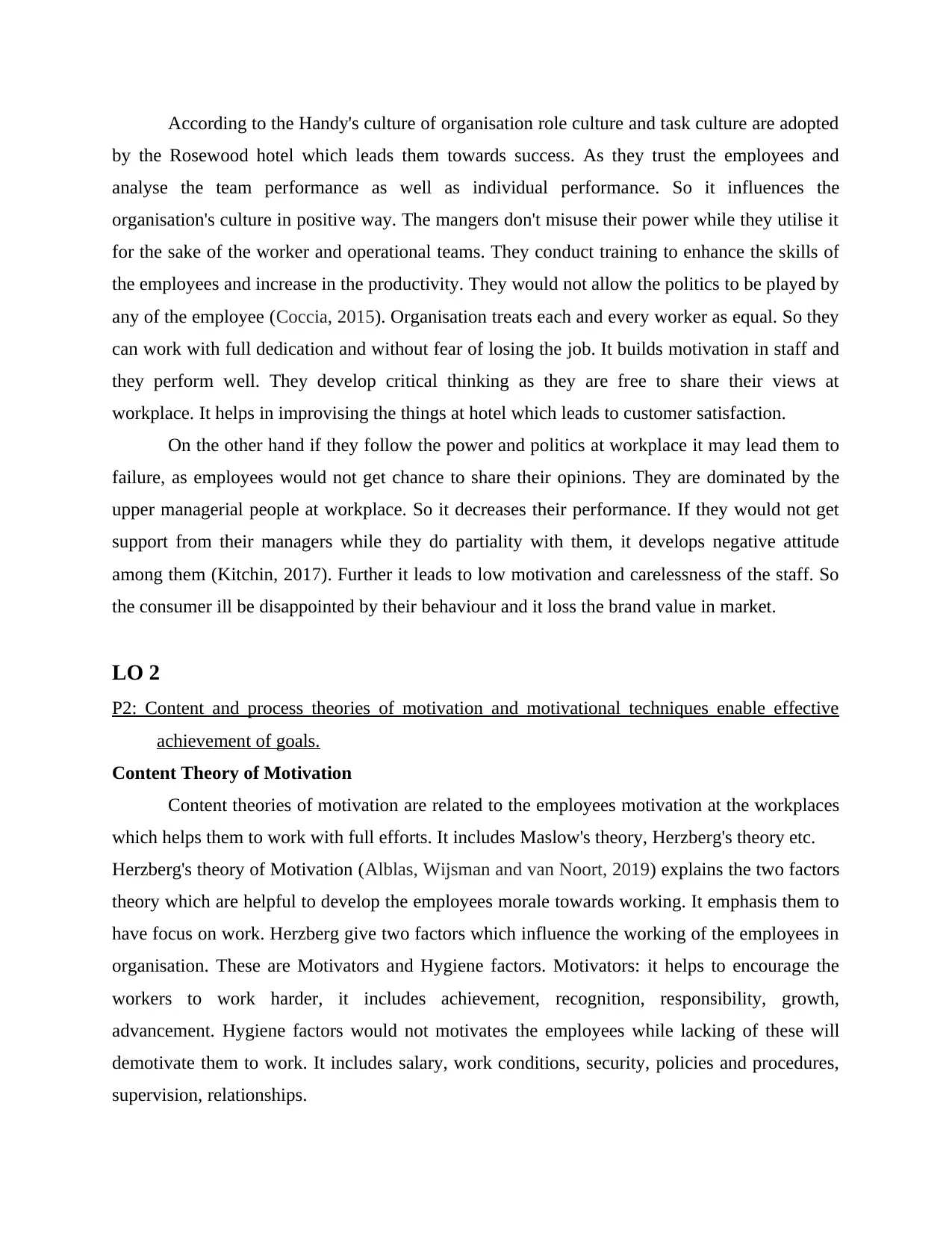
According to the Handy's culture of organisation role culture and task culture are adopted
by the Rosewood hotel which leads them towards success. As they trust the employees and
analyse the team performance as well as individual performance. So it influences the
organisation's culture in positive way. The mangers don't misuse their power while they utilise it
for the sake of the worker and operational teams. They conduct training to enhance the skills of
the employees and increase in the productivity. They would not allow the politics to be played by
any of the employee (Coccia, 2015). Organisation treats each and every worker as equal. So they
can work with full dedication and without fear of losing the job. It builds motivation in staff and
they perform well. They develop critical thinking as they are free to share their views at
workplace. It helps in improvising the things at hotel which leads to customer satisfaction.
On the other hand if they follow the power and politics at workplace it may lead them to
failure, as employees would not get chance to share their opinions. They are dominated by the
upper managerial people at workplace. So it decreases their performance. If they would not get
support from their managers while they do partiality with them, it develops negative attitude
among them (Kitchin, 2017). Further it leads to low motivation and carelessness of the staff. So
the consumer ill be disappointed by their behaviour and it loss the brand value in market.
LO 2
P2: Content and process theories of motivation and motivational techniques enable effective
achievement of goals.
Content Theory of Motivation
Content theories of motivation are related to the employees motivation at the workplaces
which helps them to work with full efforts. It includes Maslow's theory, Herzberg's theory etc.
Herzberg's theory of Motivation (Alblas, Wijsman and van Noort, 2019) explains the two factors
theory which are helpful to develop the employees morale towards working. It emphasis them to
have focus on work. Herzberg give two factors which influence the working of the employees in
organisation. These are Motivators and Hygiene factors. Motivators: it helps to encourage the
workers to work harder, it includes achievement, recognition, responsibility, growth,
advancement. Hygiene factors would not motivates the employees while lacking of these will
demotivate them to work. It includes salary, work conditions, security, policies and procedures,
supervision, relationships.
by the Rosewood hotel which leads them towards success. As they trust the employees and
analyse the team performance as well as individual performance. So it influences the
organisation's culture in positive way. The mangers don't misuse their power while they utilise it
for the sake of the worker and operational teams. They conduct training to enhance the skills of
the employees and increase in the productivity. They would not allow the politics to be played by
any of the employee (Coccia, 2015). Organisation treats each and every worker as equal. So they
can work with full dedication and without fear of losing the job. It builds motivation in staff and
they perform well. They develop critical thinking as they are free to share their views at
workplace. It helps in improvising the things at hotel which leads to customer satisfaction.
On the other hand if they follow the power and politics at workplace it may lead them to
failure, as employees would not get chance to share their opinions. They are dominated by the
upper managerial people at workplace. So it decreases their performance. If they would not get
support from their managers while they do partiality with them, it develops negative attitude
among them (Kitchin, 2017). Further it leads to low motivation and carelessness of the staff. So
the consumer ill be disappointed by their behaviour and it loss the brand value in market.
LO 2
P2: Content and process theories of motivation and motivational techniques enable effective
achievement of goals.
Content Theory of Motivation
Content theories of motivation are related to the employees motivation at the workplaces
which helps them to work with full efforts. It includes Maslow's theory, Herzberg's theory etc.
Herzberg's theory of Motivation (Alblas, Wijsman and van Noort, 2019) explains the two factors
theory which are helpful to develop the employees morale towards working. It emphasis them to
have focus on work. Herzberg give two factors which influence the working of the employees in
organisation. These are Motivators and Hygiene factors. Motivators: it helps to encourage the
workers to work harder, it includes achievement, recognition, responsibility, growth,
advancement. Hygiene factors would not motivates the employees while lacking of these will
demotivate them to work. It includes salary, work conditions, security, policies and procedures,
supervision, relationships.
Paraphrase This Document
Need a fresh take? Get an instant paraphrase of this document with our AI Paraphraser
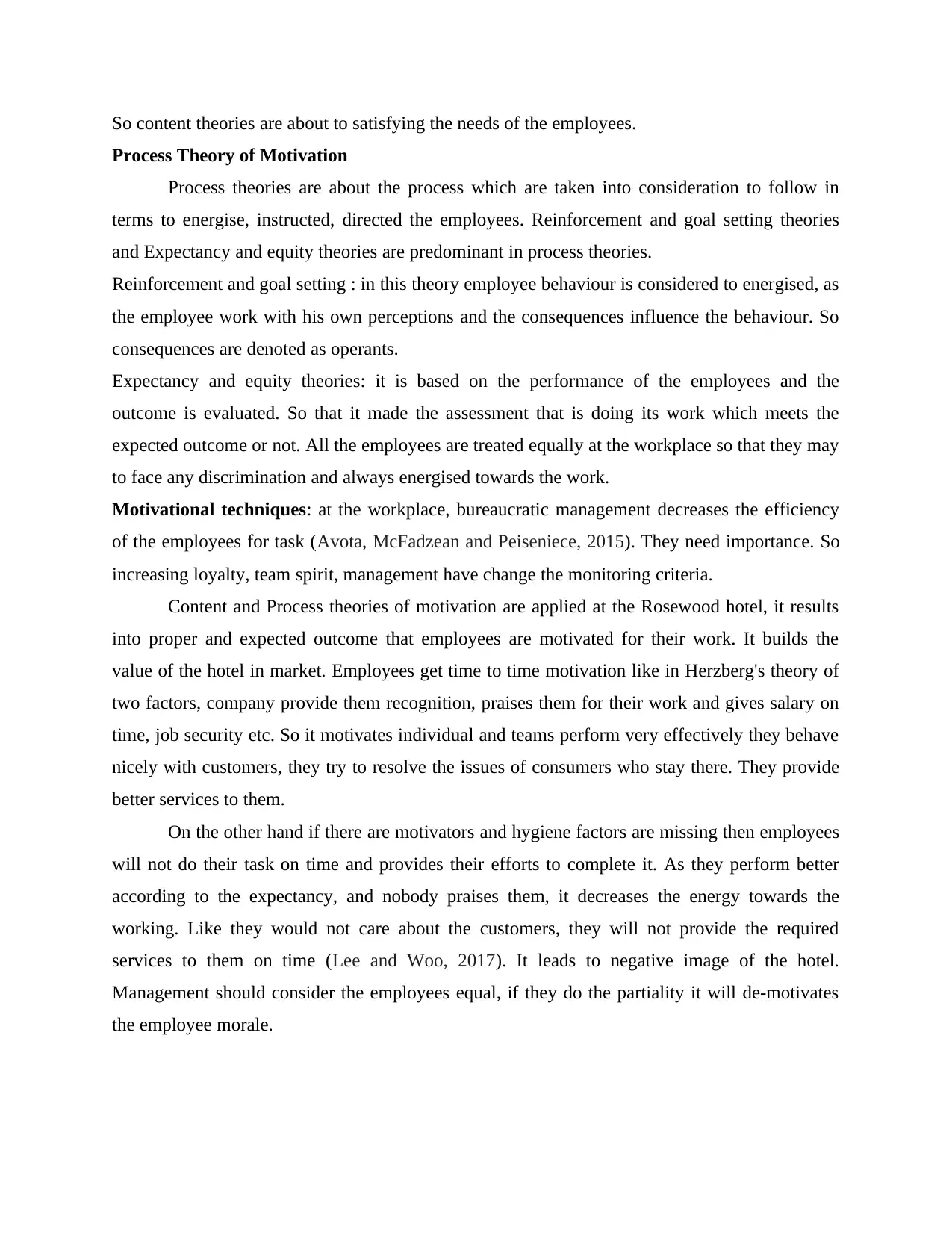
So content theories are about to satisfying the needs of the employees.
Process Theory of Motivation
Process theories are about the process which are taken into consideration to follow in
terms to energise, instructed, directed the employees. Reinforcement and goal setting theories
and Expectancy and equity theories are predominant in process theories.
Reinforcement and goal setting : in this theory employee behaviour is considered to energised, as
the employee work with his own perceptions and the consequences influence the behaviour. So
consequences are denoted as operants.
Expectancy and equity theories: it is based on the performance of the employees and the
outcome is evaluated. So that it made the assessment that is doing its work which meets the
expected outcome or not. All the employees are treated equally at the workplace so that they may
to face any discrimination and always energised towards the work.
Motivational techniques: at the workplace, bureaucratic management decreases the efficiency
of the employees for task (Avota, McFadzean and Peiseniece, 2015). They need importance. So
increasing loyalty, team spirit, management have change the monitoring criteria.
Content and Process theories of motivation are applied at the Rosewood hotel, it results
into proper and expected outcome that employees are motivated for their work. It builds the
value of the hotel in market. Employees get time to time motivation like in Herzberg's theory of
two factors, company provide them recognition, praises them for their work and gives salary on
time, job security etc. So it motivates individual and teams perform very effectively they behave
nicely with customers, they try to resolve the issues of consumers who stay there. They provide
better services to them.
On the other hand if there are motivators and hygiene factors are missing then employees
will not do their task on time and provides their efforts to complete it. As they perform better
according to the expectancy, and nobody praises them, it decreases the energy towards the
working. Like they would not care about the customers, they will not provide the required
services to them on time (Lee and Woo, 2017). It leads to negative image of the hotel.
Management should consider the employees equal, if they do the partiality it will de-motivates
the employee morale.
Process Theory of Motivation
Process theories are about the process which are taken into consideration to follow in
terms to energise, instructed, directed the employees. Reinforcement and goal setting theories
and Expectancy and equity theories are predominant in process theories.
Reinforcement and goal setting : in this theory employee behaviour is considered to energised, as
the employee work with his own perceptions and the consequences influence the behaviour. So
consequences are denoted as operants.
Expectancy and equity theories: it is based on the performance of the employees and the
outcome is evaluated. So that it made the assessment that is doing its work which meets the
expected outcome or not. All the employees are treated equally at the workplace so that they may
to face any discrimination and always energised towards the work.
Motivational techniques: at the workplace, bureaucratic management decreases the efficiency
of the employees for task (Avota, McFadzean and Peiseniece, 2015). They need importance. So
increasing loyalty, team spirit, management have change the monitoring criteria.
Content and Process theories of motivation are applied at the Rosewood hotel, it results
into proper and expected outcome that employees are motivated for their work. It builds the
value of the hotel in market. Employees get time to time motivation like in Herzberg's theory of
two factors, company provide them recognition, praises them for their work and gives salary on
time, job security etc. So it motivates individual and teams perform very effectively they behave
nicely with customers, they try to resolve the issues of consumers who stay there. They provide
better services to them.
On the other hand if there are motivators and hygiene factors are missing then employees
will not do their task on time and provides their efforts to complete it. As they perform better
according to the expectancy, and nobody praises them, it decreases the energy towards the
working. Like they would not care about the customers, they will not provide the required
services to them on time (Lee and Woo, 2017). It leads to negative image of the hotel.
Management should consider the employees equal, if they do the partiality it will de-motivates
the employee morale.
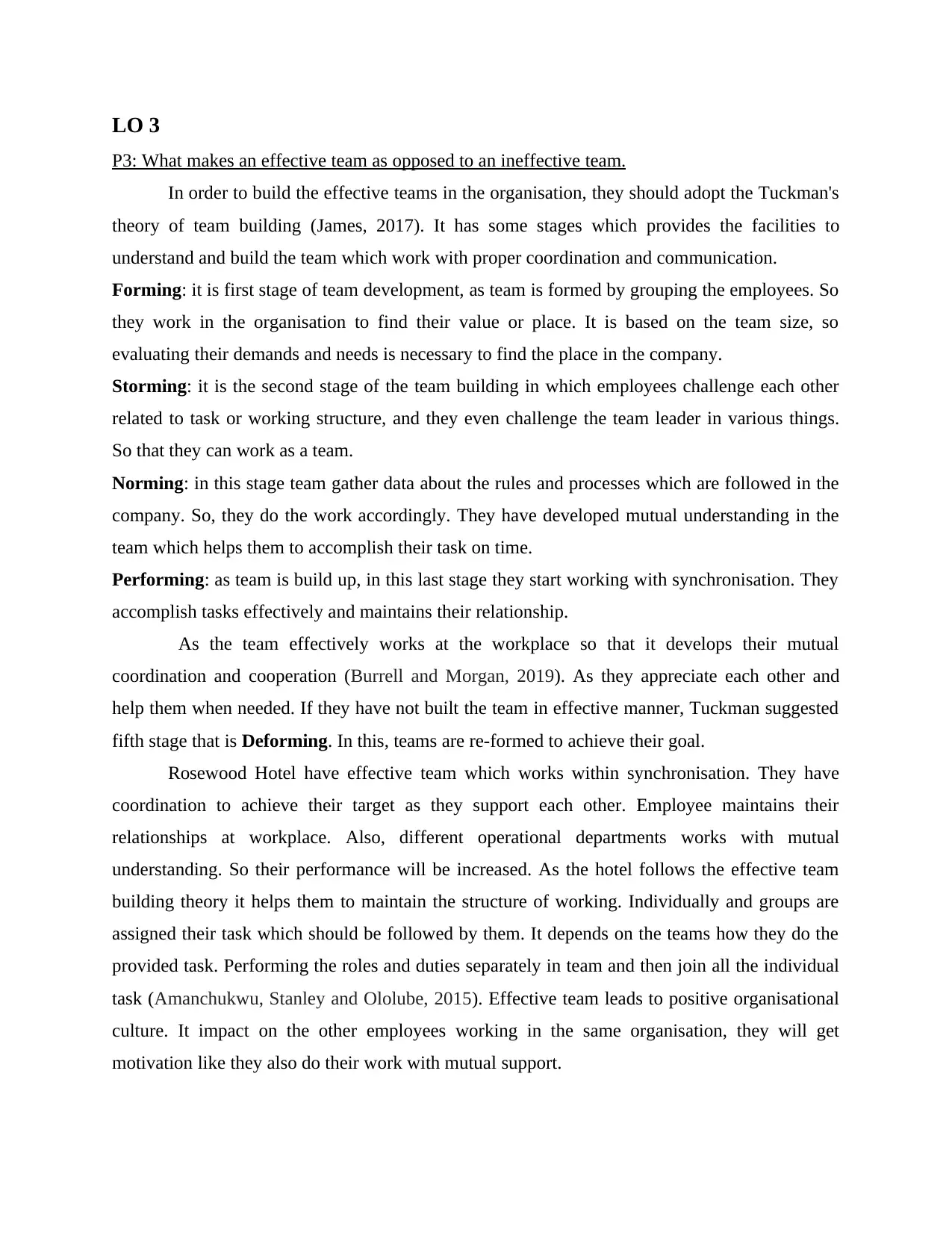
LO 3
P3: What makes an effective team as opposed to an ineffective team.
In order to build the effective teams in the organisation, they should adopt the Tuckman's
theory of team building (James, 2017). It has some stages which provides the facilities to
understand and build the team which work with proper coordination and communication.
Forming: it is first stage of team development, as team is formed by grouping the employees. So
they work in the organisation to find their value or place. It is based on the team size, so
evaluating their demands and needs is necessary to find the place in the company.
Storming: it is the second stage of the team building in which employees challenge each other
related to task or working structure, and they even challenge the team leader in various things.
So that they can work as a team.
Norming: in this stage team gather data about the rules and processes which are followed in the
company. So, they do the work accordingly. They have developed mutual understanding in the
team which helps them to accomplish their task on time.
Performing: as team is build up, in this last stage they start working with synchronisation. They
accomplish tasks effectively and maintains their relationship.
As the team effectively works at the workplace so that it develops their mutual
coordination and cooperation (Burrell and Morgan, 2019). As they appreciate each other and
help them when needed. If they have not built the team in effective manner, Tuckman suggested
fifth stage that is Deforming. In this, teams are re-formed to achieve their goal.
Rosewood Hotel have effective team which works within synchronisation. They have
coordination to achieve their target as they support each other. Employee maintains their
relationships at workplace. Also, different operational departments works with mutual
understanding. So their performance will be increased. As the hotel follows the effective team
building theory it helps them to maintain the structure of working. Individually and groups are
assigned their task which should be followed by them. It depends on the teams how they do the
provided task. Performing the roles and duties separately in team and then join all the individual
task (Amanchukwu, Stanley and Ololube, 2015). Effective team leads to positive organisational
culture. It impact on the other employees working in the same organisation, they will get
motivation like they also do their work with mutual support.
P3: What makes an effective team as opposed to an ineffective team.
In order to build the effective teams in the organisation, they should adopt the Tuckman's
theory of team building (James, 2017). It has some stages which provides the facilities to
understand and build the team which work with proper coordination and communication.
Forming: it is first stage of team development, as team is formed by grouping the employees. So
they work in the organisation to find their value or place. It is based on the team size, so
evaluating their demands and needs is necessary to find the place in the company.
Storming: it is the second stage of the team building in which employees challenge each other
related to task or working structure, and they even challenge the team leader in various things.
So that they can work as a team.
Norming: in this stage team gather data about the rules and processes which are followed in the
company. So, they do the work accordingly. They have developed mutual understanding in the
team which helps them to accomplish their task on time.
Performing: as team is build up, in this last stage they start working with synchronisation. They
accomplish tasks effectively and maintains their relationship.
As the team effectively works at the workplace so that it develops their mutual
coordination and cooperation (Burrell and Morgan, 2019). As they appreciate each other and
help them when needed. If they have not built the team in effective manner, Tuckman suggested
fifth stage that is Deforming. In this, teams are re-formed to achieve their goal.
Rosewood Hotel have effective team which works within synchronisation. They have
coordination to achieve their target as they support each other. Employee maintains their
relationships at workplace. Also, different operational departments works with mutual
understanding. So their performance will be increased. As the hotel follows the effective team
building theory it helps them to maintain the structure of working. Individually and groups are
assigned their task which should be followed by them. It depends on the teams how they do the
provided task. Performing the roles and duties separately in team and then join all the individual
task (Amanchukwu, Stanley and Ololube, 2015). Effective team leads to positive organisational
culture. It impact on the other employees working in the same organisation, they will get
motivation like they also do their work with mutual support.
⊘ This is a preview!⊘
Do you want full access?
Subscribe today to unlock all pages.

Trusted by 1+ million students worldwide
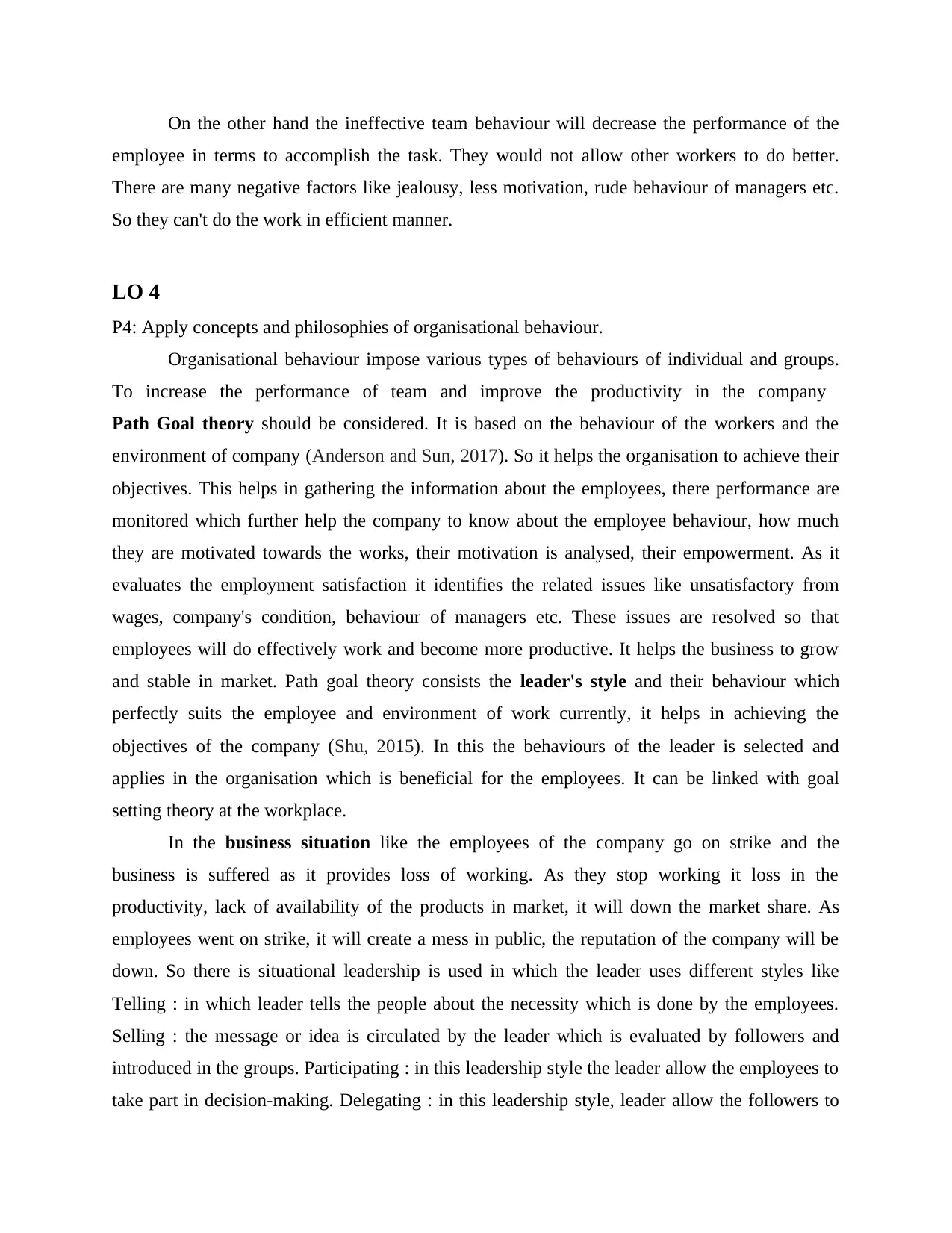
On the other hand the ineffective team behaviour will decrease the performance of the
employee in terms to accomplish the task. They would not allow other workers to do better.
There are many negative factors like jealousy, less motivation, rude behaviour of managers etc.
So they can't do the work in efficient manner.
LO 4
P4: Apply concepts and philosophies of organisational behaviour.
Organisational behaviour impose various types of behaviours of individual and groups.
To increase the performance of team and improve the productivity in the company
Path Goal theory should be considered. It is based on the behaviour of the workers and the
environment of company (Anderson and Sun, 2017). So it helps the organisation to achieve their
objectives. This helps in gathering the information about the employees, there performance are
monitored which further help the company to know about the employee behaviour, how much
they are motivated towards the works, their motivation is analysed, their empowerment. As it
evaluates the employment satisfaction it identifies the related issues like unsatisfactory from
wages, company's condition, behaviour of managers etc. These issues are resolved so that
employees will do effectively work and become more productive. It helps the business to grow
and stable in market. Path goal theory consists the leader's style and their behaviour which
perfectly suits the employee and environment of work currently, it helps in achieving the
objectives of the company (Shu, 2015). In this the behaviours of the leader is selected and
applies in the organisation which is beneficial for the employees. It can be linked with goal
setting theory at the workplace.
In the business situation like the employees of the company go on strike and the
business is suffered as it provides loss of working. As they stop working it loss in the
productivity, lack of availability of the products in market, it will down the market share. As
employees went on strike, it will create a mess in public, the reputation of the company will be
down. So there is situational leadership is used in which the leader uses different styles like
Telling : in which leader tells the people about the necessity which is done by the employees.
Selling : the message or idea is circulated by the leader which is evaluated by followers and
introduced in the groups. Participating : in this leadership style the leader allow the employees to
take part in decision-making. Delegating : in this leadership style, leader allow the followers to
employee in terms to accomplish the task. They would not allow other workers to do better.
There are many negative factors like jealousy, less motivation, rude behaviour of managers etc.
So they can't do the work in efficient manner.
LO 4
P4: Apply concepts and philosophies of organisational behaviour.
Organisational behaviour impose various types of behaviours of individual and groups.
To increase the performance of team and improve the productivity in the company
Path Goal theory should be considered. It is based on the behaviour of the workers and the
environment of company (Anderson and Sun, 2017). So it helps the organisation to achieve their
objectives. This helps in gathering the information about the employees, there performance are
monitored which further help the company to know about the employee behaviour, how much
they are motivated towards the works, their motivation is analysed, their empowerment. As it
evaluates the employment satisfaction it identifies the related issues like unsatisfactory from
wages, company's condition, behaviour of managers etc. These issues are resolved so that
employees will do effectively work and become more productive. It helps the business to grow
and stable in market. Path goal theory consists the leader's style and their behaviour which
perfectly suits the employee and environment of work currently, it helps in achieving the
objectives of the company (Shu, 2015). In this the behaviours of the leader is selected and
applies in the organisation which is beneficial for the employees. It can be linked with goal
setting theory at the workplace.
In the business situation like the employees of the company go on strike and the
business is suffered as it provides loss of working. As they stop working it loss in the
productivity, lack of availability of the products in market, it will down the market share. As
employees went on strike, it will create a mess in public, the reputation of the company will be
down. So there is situational leadership is used in which the leader uses different styles like
Telling : in which leader tells the people about the necessity which is done by the employees.
Selling : the message or idea is circulated by the leader which is evaluated by followers and
introduced in the groups. Participating : in this leadership style the leader allow the employees to
take part in decision-making. Delegating : in this leadership style, leader allow the followers to
Paraphrase This Document
Need a fresh take? Get an instant paraphrase of this document with our AI Paraphraser
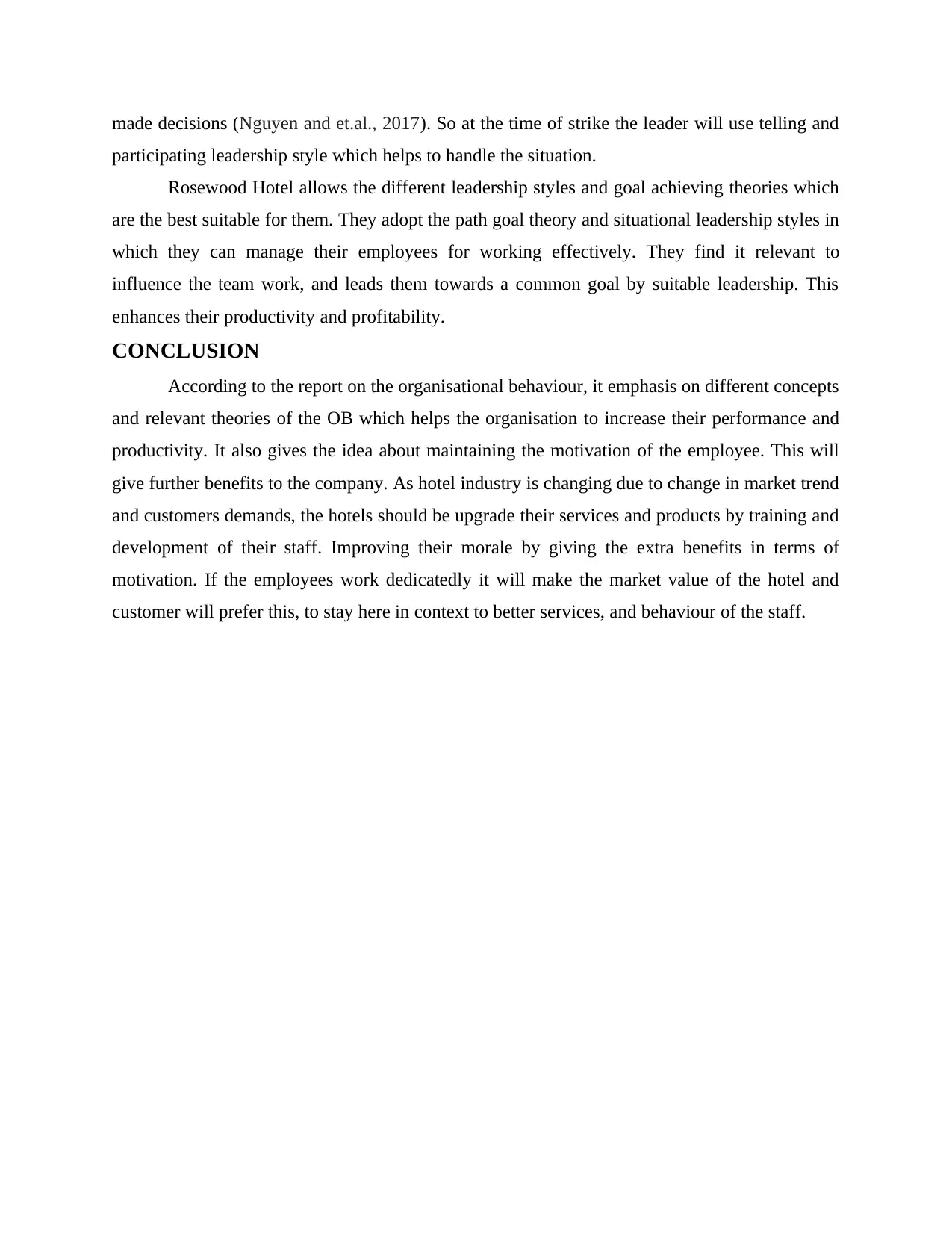
made decisions (Nguyen and et.al., 2017). So at the time of strike the leader will use telling and
participating leadership style which helps to handle the situation.
Rosewood Hotel allows the different leadership styles and goal achieving theories which
are the best suitable for them. They adopt the path goal theory and situational leadership styles in
which they can manage their employees for working effectively. They find it relevant to
influence the team work, and leads them towards a common goal by suitable leadership. This
enhances their productivity and profitability.
CONCLUSION
According to the report on the organisational behaviour, it emphasis on different concepts
and relevant theories of the OB which helps the organisation to increase their performance and
productivity. It also gives the idea about maintaining the motivation of the employee. This will
give further benefits to the company. As hotel industry is changing due to change in market trend
and customers demands, the hotels should be upgrade their services and products by training and
development of their staff. Improving their morale by giving the extra benefits in terms of
motivation. If the employees work dedicatedly it will make the market value of the hotel and
customer will prefer this, to stay here in context to better services, and behaviour of the staff.
participating leadership style which helps to handle the situation.
Rosewood Hotel allows the different leadership styles and goal achieving theories which
are the best suitable for them. They adopt the path goal theory and situational leadership styles in
which they can manage their employees for working effectively. They find it relevant to
influence the team work, and leads them towards a common goal by suitable leadership. This
enhances their productivity and profitability.
CONCLUSION
According to the report on the organisational behaviour, it emphasis on different concepts
and relevant theories of the OB which helps the organisation to increase their performance and
productivity. It also gives the idea about maintaining the motivation of the employee. This will
give further benefits to the company. As hotel industry is changing due to change in market trend
and customers demands, the hotels should be upgrade their services and products by training and
development of their staff. Improving their morale by giving the extra benefits in terms of
motivation. If the employees work dedicatedly it will make the market value of the hotel and
customer will prefer this, to stay here in context to better services, and behaviour of the staff.
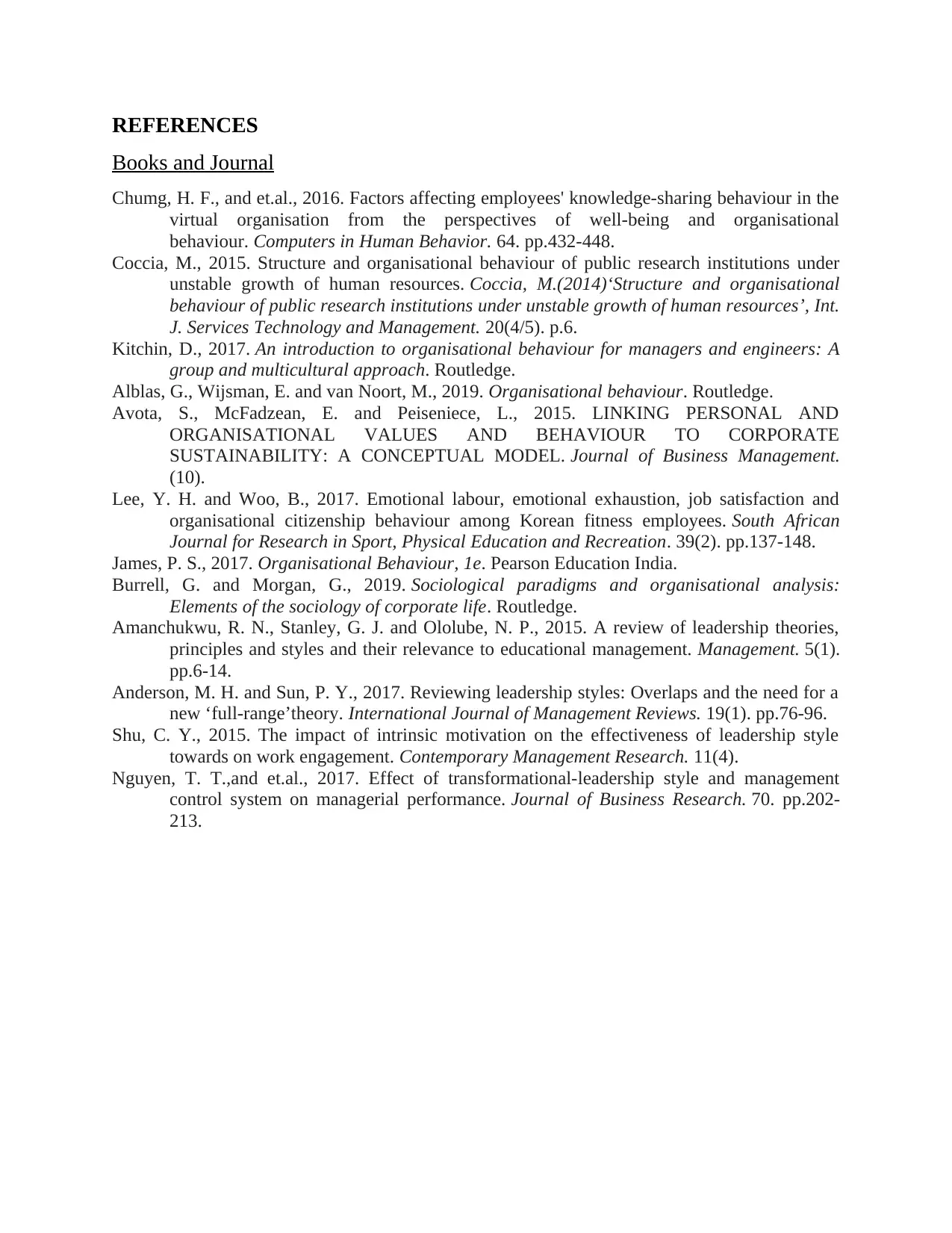
REFERENCES
Books and Journal
Chumg, H. F., and et.al., 2016. Factors affecting employees' knowledge-sharing behaviour in the
virtual organisation from the perspectives of well-being and organisational
behaviour. Computers in Human Behavior. 64. pp.432-448.
Coccia, M., 2015. Structure and organisational behaviour of public research institutions under
unstable growth of human resources. Coccia, M.(2014)‘Structure and organisational
behaviour of public research institutions under unstable growth of human resources’, Int.
J. Services Technology and Management. 20(4/5). p.6.
Kitchin, D., 2017. An introduction to organisational behaviour for managers and engineers: A
group and multicultural approach. Routledge.
Alblas, G., Wijsman, E. and van Noort, M., 2019. Organisational behaviour. Routledge.
Avota, S., McFadzean, E. and Peiseniece, L., 2015. LINKING PERSONAL AND
ORGANISATIONAL VALUES AND BEHAVIOUR TO CORPORATE
SUSTAINABILITY: A CONCEPTUAL MODEL. Journal of Business Management.
(10).
Lee, Y. H. and Woo, B., 2017. Emotional labour, emotional exhaustion, job satisfaction and
organisational citizenship behaviour among Korean fitness employees. South African
Journal for Research in Sport, Physical Education and Recreation. 39(2). pp.137-148.
James, P. S., 2017. Organisational Behaviour, 1e. Pearson Education India.
Burrell, G. and Morgan, G., 2019. Sociological paradigms and organisational analysis:
Elements of the sociology of corporate life. Routledge.
Amanchukwu, R. N., Stanley, G. J. and Ololube, N. P., 2015. A review of leadership theories,
principles and styles and their relevance to educational management. Management. 5(1).
pp.6-14.
Anderson, M. H. and Sun, P. Y., 2017. Reviewing leadership styles: Overlaps and the need for a
new ‘full‐range’theory. International Journal of Management Reviews. 19(1). pp.76-96.
Shu, C. Y., 2015. The impact of intrinsic motivation on the effectiveness of leadership style
towards on work engagement. Contemporary Management Research. 11(4).
Nguyen, T. T.,and et.al., 2017. Effect of transformational-leadership style and management
control system on managerial performance. Journal of Business Research. 70. pp.202-
213.
Books and Journal
Chumg, H. F., and et.al., 2016. Factors affecting employees' knowledge-sharing behaviour in the
virtual organisation from the perspectives of well-being and organisational
behaviour. Computers in Human Behavior. 64. pp.432-448.
Coccia, M., 2015. Structure and organisational behaviour of public research institutions under
unstable growth of human resources. Coccia, M.(2014)‘Structure and organisational
behaviour of public research institutions under unstable growth of human resources’, Int.
J. Services Technology and Management. 20(4/5). p.6.
Kitchin, D., 2017. An introduction to organisational behaviour for managers and engineers: A
group and multicultural approach. Routledge.
Alblas, G., Wijsman, E. and van Noort, M., 2019. Organisational behaviour. Routledge.
Avota, S., McFadzean, E. and Peiseniece, L., 2015. LINKING PERSONAL AND
ORGANISATIONAL VALUES AND BEHAVIOUR TO CORPORATE
SUSTAINABILITY: A CONCEPTUAL MODEL. Journal of Business Management.
(10).
Lee, Y. H. and Woo, B., 2017. Emotional labour, emotional exhaustion, job satisfaction and
organisational citizenship behaviour among Korean fitness employees. South African
Journal for Research in Sport, Physical Education and Recreation. 39(2). pp.137-148.
James, P. S., 2017. Organisational Behaviour, 1e. Pearson Education India.
Burrell, G. and Morgan, G., 2019. Sociological paradigms and organisational analysis:
Elements of the sociology of corporate life. Routledge.
Amanchukwu, R. N., Stanley, G. J. and Ololube, N. P., 2015. A review of leadership theories,
principles and styles and their relevance to educational management. Management. 5(1).
pp.6-14.
Anderson, M. H. and Sun, P. Y., 2017. Reviewing leadership styles: Overlaps and the need for a
new ‘full‐range’theory. International Journal of Management Reviews. 19(1). pp.76-96.
Shu, C. Y., 2015. The impact of intrinsic motivation on the effectiveness of leadership style
towards on work engagement. Contemporary Management Research. 11(4).
Nguyen, T. T.,and et.al., 2017. Effect of transformational-leadership style and management
control system on managerial performance. Journal of Business Research. 70. pp.202-
213.
⊘ This is a preview!⊘
Do you want full access?
Subscribe today to unlock all pages.

Trusted by 1+ million students worldwide
1 out of 9
Related Documents
Your All-in-One AI-Powered Toolkit for Academic Success.
+13062052269
info@desklib.com
Available 24*7 on WhatsApp / Email
![[object Object]](/_next/static/media/star-bottom.7253800d.svg)
Unlock your academic potential
Copyright © 2020–2026 A2Z Services. All Rights Reserved. Developed and managed by ZUCOL.





